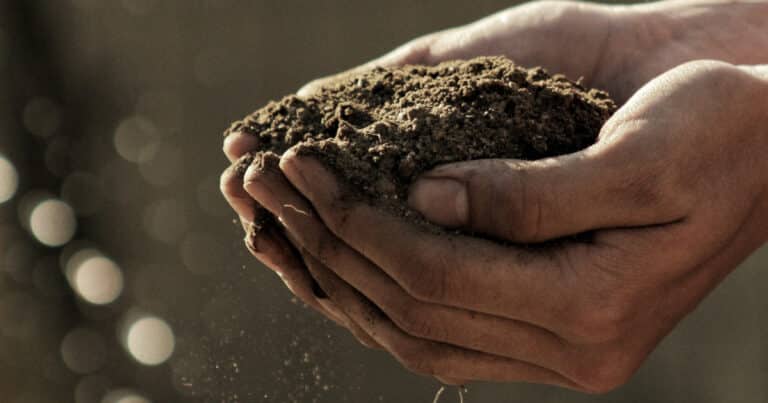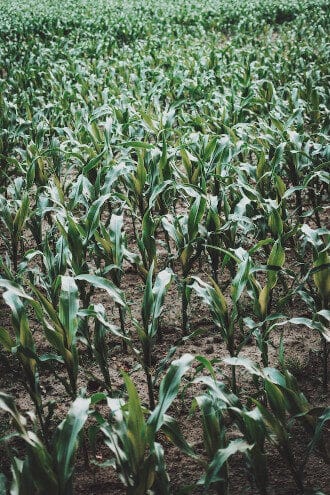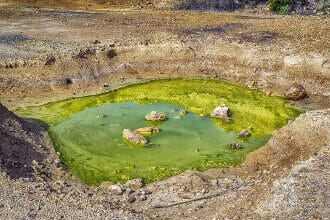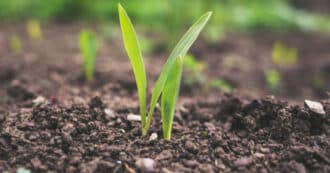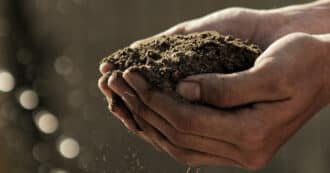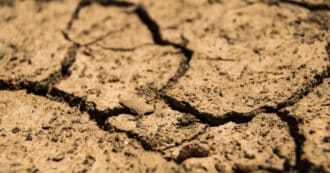By Harry Cooper – To many people, soil may seem like nothing more than the dirt we walk on. But soil is much more complex than that, and is an important part of the Earth, with critical ecological functions.
Soil is an important factor in a variety of nutrient cycles. It helps to move nutrients from decomposing organic materials back into plants and the rest of the food chain.
Soil also helps absorb and percolate water into ground water stores. This process keeps the water cycle stable and is very important for maintaining a healthy water table.
These kind of functions are critical for ecosystems everywhere to operate properly. They are also important for growing food and agricultural productivity.
The Earth Beneath Our Feet
Soil is incredibly important for humanity’s wellbeing. But ironically, humans are also one of the biggest threats to soil quality.
Unhealthy agricultural techniques and increasing urbanization are decreasing soil health across the globe. This kind of soil degradation impairs its ability to perform its essential functions, causing harmful impacts to the environment and human life.
Important Functions of Soil
Nutrient Cycling
Soil plays an important function in a variety of nutrient cycles. Plants and animals everywhere rely on healthy soil to help keep nutrients in the food web.
The process of nutrient cycling starts when a plant or animal dies, and finds its way to the soil. It then starts to be decomposed by the complex soil food web.
This food web is home to all kinds of soil microorganisms that feed on dead organic matter. These include different types of fungi and bacteria.
These beneficial soil microbes break down organic materials into simpler components. This helps to spread the nutrients found in the decomposing organic matter throughout the soil.
These nutrients, such as phosphorus, carbon, and nitrogen, can then be utilized by plants growing in the soil. A large amount of organic matter and nutrients is a sign of healthy soils, and the more nutrients soil has, the more plant growth it can support.
The Water Table
Soil also performs important functions for the water cycle. When soil is healthy its soil particles are spaced apart and porous, allowing for water to pass through.
This kind of soil structure is critical for maintaining the water table. When soil is porous, it allows for water storage to be used by plants.
These pores also allow water to be percolated downward into the groundwater. This process is crucial for replenishing groundwater stores.
However, unhealthy soil affects the water table and water quality negatively. When soil is compact, water can’t infiltrate it as well so it can cause harmful erosion that strips away the top layers of soil.
Mitigating harmful contaminants
Healthy soil that can easily be infiltrated by water is not just important for preventing erosion and restoring groundwater. It also has the capacity to filter out pollutants that would otherwise contaminate water supplies.
Soil is capable of acting as a filter. Soil removes harmful contaminants from water as it passes through the soil.
Microorganisms are mainly responsible for this process. They break down pollutants into less harmful chemicals.
Soil Health Risks
Soil health is incredibly important. But human activity all across the globe is causing massive soil degradation.
Without healthy soils, we are losing out on a variety of ecosystem services. By losing these services we are creating dire consequences for both people and planet.
Monocropping
One of the most important aspects of soil health is its organic matter content and the presence of microorganisms. These rely on a diversity of different kinds of plants being grown and decomposing in the soil.
However, this process gets interrupted by the practice of monocropping. Monocropping is an agricultural technique in which one species of crop is grown over a large area of land.
By removing the diversity of life found in soil, monocropping inhibits the soils ability to cycle nutrients. This decimates once biodiverse ecosystems, and makes it harder for farmers to continue growing their crops.
Chemical Fertilizers
Inorganic fertilizers used in gardens or on farms are meant to add nutrients to the soil to help plant growth. While this works in the short term, it can have long term consequences.
The chemicals found in inorganic fertilizers can be dangerous to natural microorganisms by changing the soil pH levels. This disrupts the soil’s natural ability to produce and cycle nutrients.
By depleting natural soil nutrients, chemical fertilizers make the soil reliant on inorganic nutrient supplementation. This makes it so that more and more fertilizer is needed to grow healthy plants overtime.
Urbanization and Other Contaminants
There are a variety of other contaminants that pollute the soil and degrade its quality. These contaminates come from all kinds of harmful human activity.
One kind of contaminate is pesticides used on farms and lawns. While these pesticides help keep away pests, when they leech into the soil they poison it with harmful chemicals.
Other kinds of harmful chemical contamination are a result of increasing urbanization. This includes processes that release petroleum, radon, asbestos, lead, and other harmful chemicals into the soil.
One of these harmful results of urbanization is an increase in cars. Cars often leak oil onto the road which will eventually run off with rain and contaminate soil.
Another risk to soil health is an increase in industrial manufacturing. These industrial processes often produce toxic chemicals as a byproduct, which are often improperly disposed of in ways that can leech into nearby soils.
Soil and Religion
Eco Bible
Deuteronomy 7:13 – He will favor you and bless you and multiply you; He will bless the issue of your womb and the produce of your soil, your new grain and wine, and oil, the calving of your herd and the lambing of your flock, in the land that He swore to your fathers to assign to you.
Life Comes From The Soil
Rabbi Moshe Alshich (16th century) explains that this blessing covers the four categories of existence: mineral, plant, animal, and human. The soil is mineral. “Grain, wine, and oil” are plant. “Calves and lambs” are animal, and “the issue of your womb” is human.
With this in mind, note the order: human, mineral, plant, and animal. There is a clear ecological message here. You will be blessed [with greater offspring] through the produce of the soil, which will grow more plant matter, and the plant matter will lead to higher fertility in your flocks and herds.
Research on cattle fertility states that fertility rates are “highly influenced by the environment and energy intake is a pivotal factor.”
Everything stems from the soil and the rain. If we do our part in caring for creation, the natural processes put in place by God from the beginning of creation will do their part and ensure that we are blessed.
* Featured image source

